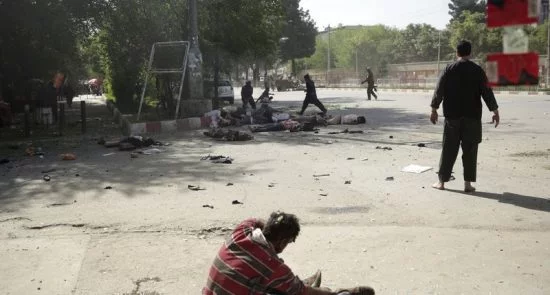Afghanistan, Security December 5, 2018
Short Link:US Marine Officer Warned Congress about Afghanistan War
The fight in Afghanistan is at a stalemate, and the significant number of Afghan troop deaths in the war is not sustainable, the Marine officer nominated to command U.S. forces in the Middle East told lawmakers on Tuesday.
Ariana News Agency- Marine Lt. Gen. Kenneth McKenzie warned the Senate Armed Services Committee against an abrupt withdrawal of American forces or change in strategy despite frustration over the status of the 17-year conflict. He said he doesn’t know how long it will take to develop an Afghan force capable of defending its own country.
“If we left precipitously right now, I do not believe they would be able to successfully defend their country,” McKenzie said.
McKenzie said the U.S. and its allies need to keep helping the Afghans recruit and train forces to fight the Taliban’s estimated 60,000 troops.
“They’re fighting hard, but their losses are not going to be sustainable unless we correct this problem,” McKenzie said, in one of the U.S. military’s more dire assessments of the Afghan losses.
In its most recent report to Congress, in October, the special inspector general for Afghanistan said Afghan casualty numbers had been reported only in classified form since September 2017 at the request of the Afghan government. The report, however, said that the average number of casualties between May and October this year was the greatest it has ever been during similar periods.
On Oct. 30, Defense Secretary Jim Mattis said Afghan forces had more than 1,000 dead and wounded during August and September alone. Afghan President Ashraf Ghani said in a November speech that more than 28,000 of his country’s forces had been killed in the last four years.
McKenzie’s grim assessment comes amid growing frustration among Congress over lack of progress in the 17-year Afghan conflict. Lawmakers peppered the general with questions about lack of advancement in the war, and why the Taliban has been gaining control of additional territory.
Sen. Ben Peters, D-Mich., told McKenzie that Congress members have been hearing about a political settlement for years.
“We’ve been at it for 17 years; 17 years is a long time,” said Peters. “What are we doing differently when it comes to the Afghan security forces that we haven’t done for 17 years?”
McKenzie, who is director of the Joint Staff and who served two tours in Afghanistan, acknowledged the frustration. But he said the government has opted to secure the more populated areas of the country, while ceding control of more remote, sparsely occupied regions to the insurgents.
He also voice optimism over the invigorated effort to negotiate peace with the Taliban.
President Donald Trump late last month expressed a willingness to continue support for the war, asserting that the U.S. is in “very strong negotiations,” an apparent reference to U.S. special envoy Zalmay Khalilzad’s efforts to get the Taliban to agree to peace talks.
At the same time, however, Trump indicated he had little confidence the talks are going to succeed. “Maybe they’re not. Probably they’re not,” he said.
Khalilzad, who was appointed in September, met Tuesday with Pakistani officials, and a Taliban official said four members from the group’s political office in the Middle Eastern state of Qatar were also in the Pakistani capital. Khalilzad will also travel to Afghanistan, Russia, Uzbekistan, Turkmenistan, Belgium, the United Arab Emirates and Qatar.
He held three days of talks with the Taliban in Qatar in November, according to the Taliban. The U.S. has not confirmed or denied direct talks.










